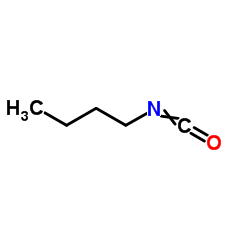异氰酸正丁酯
一般危化品

异氰酸正丁酯结构式
|
常用名 | 异氰酸正丁酯 | 英文名 | 1-Isocyanatobutane |
|---|---|---|---|---|
| CAS号 | 111-36-4 | 分子量 | 99.131 | |
| 密度 | 0.9±0.1 g/cm3 | 沸点 | 115.0±0.0 °C at 760 mmHg | |
| 分子式 | C5H9NO | 熔点 | 85.5℃ | |
| MSDS | 中文版 美版 | 闪点 | 17.8±0.0 °C | |
| 符号 |




GHS02, GHS05, GHS06, GHS08 |
信号词 | Danger |
|
n-Butyl isocyanide oxidation at the [NiFe4S4OH(x)] cluster of CO dehydrogenase.
J. Biol. Inorg. Chem. 17(2) , 167-73, (2012) Carbon monoxide dehydrogenases (CODHs) catalyze the reversible oxidation of carbon monoxide by reaction with water to yield carbon dioxide, two protons, and two electrons. Two principal types of CODHs can be distinguished. Ni,Fe-containing CODHs contain a [Ni... |
|
|
Assessing N,N'-Dibutylurea (DBU) formation in soils after application of n-butylisocyanate and benlate fungicides.
J. Agric. Food Chem. 52(4) , 747-54, (2004) N,N'-Dibutylurea (DBU) is a breakdown product of benomyl [methyl 1-(butylcarbamoyl)-2-benzimidazole carbamate], the active ingredient in Benlate fungicides, and has been proposed as one cause for crop damage that growers claim to have occurred from the use of... |
|
|
Butyl isocyanide as a probe of the activation mechanism of soluble guanylate cyclase. Investigating the role of non-heme nitric oxide.
J. Biol. Chem. 282(49) , 35741-8, (2007) Nitric oxide (NO) is a physiologically relevant activator of the hemoprotein soluble guanylate cyclase (sGC). In the presence of NO, sGC is activated several hundredfold above the basal level by a mechanism that remains to be elucidated. The heme ligand n-but... |
|
|
Isocyanate binding to yeast glutathione reductase measured by fluorescence spectroscopy.
Biochem. Soc. Trans. 25(1) , 47S, (1997)
|
|
|
Altered lung function in rats after subacute exposure to n-butyl isocyanate.
Arch. Toxicol. 66(2) , 118-25, (1992) The objectives of this study were to use pulmonary function tests, blood gas measurements and bronchoalveolar lung lavage (BAL) to characterize lesions in the respiratory tract of young adult male Wistar rats as a result of a 5-day exposure (6 h/day) to 0, 1.... |
|
|
Carbendazim and n-butylisocyanate: metabolites responsible for benomyl double action on cytochrome P450 in HepG2 cells.
Toxicology 123(1-2) , 135-42, (1997) Changes in the cytochrome P450 monooxygenase system were investigated in HepG2 cells treated for 24 h with 1.25, 2.5, 5, 10 and 20 microg/ml of carbendazim (MBC) and n-butylisocyanate (BIC), the principal benomyl metabolites. The results show that n-butylisoc... |
|
|
Novel dynamic flow cytoenzymological determination of intracellular esterase inhibition by BCNU and related isocyanates.
Biochem. Pharmacol. 36(21) , 3731-8, (1987) We present a novel dynamic flow cytoenzymological demonstration of the potent inhibition by the antitumour chloroethylnitrosourea BCNU of the intracellular hydrolysis of fluorescein diacetate by esterases of viable, intact murine and human tumour cells in vit... |
|
|
Identification of S-(n-butylcarbamoyl)glutathione, a reactive carbamoylating metabolite of tolbutamide in the rat, and evaluation of its inhibitory effects on glutathione reductase in vitro.
Chem. Res. Toxicol. 12(12) , 1138-43, (1999) Tolbutamide (TOLB), a widely used hypoglycemic agent in the therapy of non-insulin-dependent diabetes mellitus, has been reported to be teratogenic and/or embryotoxic in several animal species and humans. It has been proposed that the teratogenic effects of T... |
|
|
Functional, biochemical, and histopathological evidence of airway obstruction in rats following a four-hour acute inhalation exposure to n-butyl isocyanate.
Exp. Pathol. 40(4) , 197-202, (1990) Pulmonary function, arterial blood gases, acid-base status, and bronchoalveolar lavage fluid (BALF) composition were assessed in male Wistar rats after a single 4-h exposure to 0, 7.6, 23.5 or 55.2 mg n-butyl isocyanate (n-BIC)/m3 air. No significant changes ... |
|
|
Toxic effects of carbendazim and n-butyl isocyanate, metabolites of the fungicide benomyl, on early development in the African clawed frog, Xenopus laevis.
Environ. Toxicol. 23(1) , 131-44, (2008) We investigated the toxic effects of carbendazim and n-butyl isocyanate (BIC), metabolites of the fungicide benomyl, on development in the African clawed frog, Xenopus laevis. To test the toxic effects, frog embryo teratogenesis assays using Xenopus were perf... |